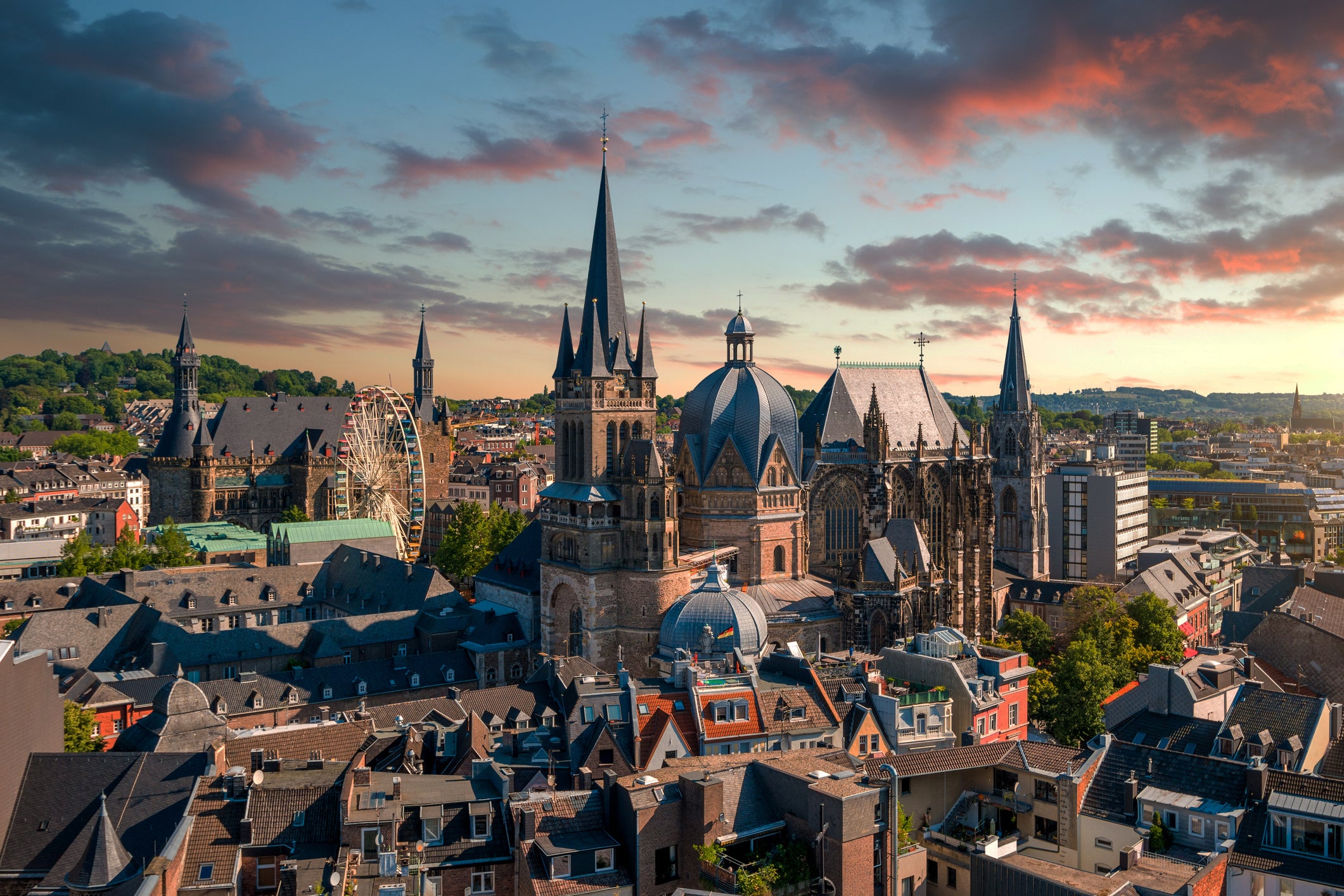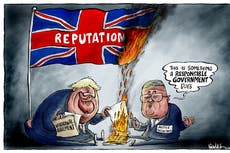Why the unfamiliar city of Aachen is the spiritual centre of today’s EU
When Boris Johnson declared that attempts at European unity had failed, he should have looked at the father of modern Europe, the German king Charlemagne, whose Holy Roman Empire lasted for over 1,000 years, writes William Cook


In the ancient city of Aachen, midway between Brussels and Cologne, there is a building which reveals the medieval origins of the European Union. This cathedral is the last surviving relic of the palace of Charlemagne, founder of the Holy Roman Empire and the father of modern Europe.
From this palace here in Aachen, Charlemagne ruled an empire whose borders were remarkably similar to the boundaries of the original Common Market. Just a coincidence? Perhaps, in part. But it also points to something deeper. At a time when Britain’s relations with the EU have been reduced to unseemly squabbles about state aid and fishing quotas, a visit to Aachen is a timely reminder that the EU isn’t only about red tape. Like Brexit, it’s a concept that’s rooted in a deep sense of shared identity. And unlike Brexit, it has a history that stretches back 1,200 years.
The EU is a relatively modern institution, dating back to the creation of the European Coal and Steel Community in the sombre aftermath of the Second World War. Out of this groundbreaking partnership, between France, Italy, the Benelux and West Germany, evolved the European Economic Community (EEC) and then the EU. Yet the idea of European unity is nothing new. “Napoleon, Hitler, various people tried this out and it ends tragically,” declared Boris Johnson during the Brexit campaign four years ago. “The EU is an attempt to do this by different methods.”
Johnson’s crass comparison caused outrage, but was he right? Does the road to a united Europe always end in tragedy? As a metropolitan Remoaner (and a German citizen to boot) I’d say the opposite is the case. Napoleon was a genius, but he conquered Europe in the name of France. Hitler was a genocidal maniac who conquered Europe in the name of Germany. These were nationalistic, militaristic empires, which is why they fell apart so fast.
If Johnson had ended up on the other side in that great debate (as he so easily could have done) he might just as well have summoned up the ghost of Charlemagne – a less familiar but more friendly figurehead for the idea of European unity. Charlemagne’s Holy Roman Empire lasted for a thousand years, and although it collapsed 200 years ago, its antique capital, Aachen, remains the spiritual centre of today’s EU.
Aachen was established by the Romans, who came here to bathe in its thermal springs. When the Roman empire collapsed, the spa town they founded, Aquae Granni, fell into decline, but its hot springs kept on bubbling – as they still do today. It was these mineral springs which attracted the Frankish King Charlemagne (aka Charles the Great or Karl der Grosse). He established his court here at the end of the eighth Century, and on Christmas Day 800AD he was crowned emperor of the Romans by Pope Leo III.

The Romans had ruled much of Europe for several centuries, but their empire also straddled north Africa and the Middle East. Charlemagne’s Holy Roman Empire, on the other hand, was purely European. Neither holy, Roman nor an empire, it was its hotchpotch nature which gave this loose confederation such staying power. Most of its inhabitants were German, but its fluctuating borders also encompassed large parts of modern France, Italy, the Benelux, the Czech Republic, Austria and Poland. Its constituent states retained their own identities. It wasn’t bent on world domination. Its leaders were elected, albeit by Europe’s princes, not its commoners (well, you can’t have everything – this was the Middle Ages, after all). It survived the Black Death and repelled the invading Ottomans, before it was finally broken up by Napoleon in 1806.
It was the nationalist era that followed which ended tragically for mainland Europe, as Germany filled the power vacuum the Holy Roman Empire left behind. In the course of 70 years, France and Germany went to war three times, and after the Second World War they vowed never to go to war again. The nascent EEC was central to this new partnership. Pooling coal and steel production made another Franco-German war practically impossible. This wasn’t just an economic project. It was a peace project, too.
As luck would have it, I stumbled into journalism just after the fall of the Berlin Wall, and filed my first report from Germany just after German reunification. I travelled around eastern Germany and on into Poland and the Czech Republic. I travelled across Romania, from Bucharest to the Black Sea. I travelled through Lithuania and Latvia and on into Estonia – previously Soviet republics, now all independent states. For me, and millions like me, who’d grown up during the Cold War, the liberation of these Soviet satellites felt like the final vindication of the European project. Throughout my childhood, these countries had been enemy territory, cut off behind the Iron Curtain. Now they were queuing up to join the EU.
One memory of that happy, hopeful decade stands out. The first time I crossed the border from Eeastern Germany into the Czech Republic was on foot, across the Erzgebirge Mountains. The border post was in a forest. As I reached the border crossing a Czech soldier emerged from a wooden hut and asked to see my passport. I came back the same way a few years later. The border post was still there but now the hut was empty. There was no one to check my passport. The soldiers had disappeared.
Napoleon, Hitler, various people tried this out and it ends tragically. The EU is an attempt to do this by different methods
Since then I’ve reported from all over Europe, from the Basque Country to the Baltic States, and as I’ve seen Europe come together I’ve seen the United Kingdom come apart. This rift, between what the writer David Goodhart called Somewheres and Anywheres, existed long before Brexit, but the Brexit referendum exposed and exacerbated this great divide.
And yet this kulturkampf is hardly peculiar to Britain. In most continental countries you’ll encounter the same growing gulf between progressive and traditionalist attitudes, between the liberalism of the big cities and the cultural conservatism of the small towns. Consequently, when Britain voted Leave there was a good deal of speculation that Brexit would set a precedent, and inspire other EU members to quit the club. Yet four years on, it hasn’t happened. Why not? The EU is beset with problems – always has been, always will be – but despite their many differences the remaining member states have all opted to stay put. What looked like the beginning of a process now looks like a populist outlier, a Trumpian aberration. So why are mainland Europeans so much more relaxed about European integration? After all, on both sides of the Channel, our biggest headaches are much the same. I believe it all boils down to our perception of the past.
During the past 30 years I’ve reported from most countries in the EU, and while I’ve met very few Europeans who are starry-eyed about the EU, I’ve met even fewer who want out. So why are things so different in Brexit Britain? The conclusion I’ve come to is that it’s about the stories we tell ourselves, about the places we come from and how these places fit into the wider world. More than economics or geopolitics, or constitutional issues, it’s these stories that shape our attitude to Europe, and ourselves.
Continental Europeans, and the Scots and Irish, take comfort from the idea that they’re part of a shared European culture. The English (and perhaps the Welsh) are prouder of the ways in which they stand apart. Growing up in England, in the 1970s and 1980s, I learned hardly anything about European history, save for the times when its upheavals had inconvenienced Britain. The way we were taught it, England had invented democracy, created the mother of all parliaments, avoided revolution (unlike those hot-headed continentals), ended the transatlantic slave trade (never mind that we’d started it) and won virtually every battle we’d ever fought in.
Perhaps the most pernicious element of this selective education was the assumption that the UK was a single settled entity, unsullied by the violent turmoil that plagued those chaotic countries across the Channel. We were never taught that the UK had only existed in its current form for half a century, or that the union with Scotland was only a few hundred years old. We learnt next to nothing about Scotland’s separate history, and nothing whatsoever about Ireland. Hardly any of us knew that Britain had endured several civil wars, numerous Scottish insurrections and a grim relationship with Ireland that had festered for 800 years. My schooldays were bookmarked by Bloody Sunday and the hunger strikes, yet the Troubles were barely mentioned, and never with any explanation about the origins of the conflict. The borders of the UK were depicted as eternal and inviolate, with no mention that the south of Ireland had left barely 50 years before, or that Northern Ireland was a recent construct, riven by virtual civil war.
When I began my journalistic journey around Europe in 1990, I was a dedicated Europhile, yet I barely knew Europe at all. Thirty years later, I’m still a Europhile, but I’m not so idealistic
Compare this to the way history is taught outside England, and you begin to understand why English attitudes to Europe are so different. Edinburgh’s National Museum of Scotland highlights Scotland’s age-old internationalism – its links with Ireland and Scandinavia, and its Auld Alliance with France. The German Historical Museum in Berlin highlights Germany’s shifting borders, its volatile relationships with the countries that surround it. I had to travel to Waterloo to learn about the multinationalism of Wellington’s army, about the Dutch and German soldiers who fought with him. I had to travel to Ypres to learn about the horror and futility of the First World War.
When I began my journalistic journey around Europe in 1990, I was a dedicated Europhile, yet I barely knew Europe at all. Thirty years later, I’m still a Europhile, but I’m not so idealistic. The EU is a muddle – too remote, too bureaucratic – but it’s kept the peace in Europe these last 75 years, made most Europeans a good deal richer, and pushed back the boundaries of freedom and democracy from the Elbe to the Russian border. The euro was introduced prematurely, and the eurozone grew too quickly, but the currency has held its own and grown in value against sterling. Greece never should have joined and several other countries joined too soon, but in places like Aachen, where people crisscross international borders several times a day, a common currency feels like common sense. Plenty of people around here live in Belgium, work in Germany and go shopping in the Netherlands. Today the idea of them juggling three separate currencies seems absurd.
And yet the past few years have also made me a Brexiteer. Don’t get me wrong. I doubt that Brexit will do Britain any good at all, but as a passionate believer in the EU’s shared ideals, I believe that so long as so many Britons remain so hostile to those ideals, any form of British membership would merely drag Europe down. Brexit may well do Britain a great deal of harm, but the future of Europe is more important.
In the long term, I believe Britain will tiptoe back into Europe, towards a semi-detached relationship along much the same lines as Switzerland. It will take a generation. It will take a lot of time and trouble. In the meantime, to reach an adequate accommodation with the EU and avoid the worst effects of a no-deal Brexit, Britons need to acquire a better understanding of the vision that drives the EU. Remainers never understood that for Leavers, Brexit wasn’t just about the money. Brexiteers still don’t understand that, for Europhiles, the European Union is about more than money, too.
I remember a Flemish man who guided me round the First World War battlefields of Flanders. As we walked around these fallow fields, in the no-man’s-land between the trenches, we talked about Europe, then and now. He was angry about Brexit. He felt that for Britain to turn its back on Europe was a betrayal of the British soldiers who’d died here. The way he saw it, they’d laid down their lives in the war to end all wars. By voting to leave the EU, Britain was weakening the European alliance and making another war more likely. It was only one point of view and I didn’t entirely agree with him (in some ways, I think Brexit will make the EU stronger – it’s already made it more popular) but it’s a point of view that Britons rarely hear. Brexiteers get all misty-eyed about Spitfires and the white cliffs of Dover. They need to know that Europhiles have their own touchstones too. For Brexiteers, the two world wars affirm the importance of British independence. For Europhiles, these wars are an affirmation of the importance of the EU.
In my travels across the continent I’ve met many Europeans who share this point of view. In Latvia and Estonia, the EU is regarded as a bulwark against Russian aggression, an institution that bolsters national sovereignty rather than undermining it. In the Georgian capital, Tbilisi, EU flags fly outside government buildings – not because Georgia is an EU member, but because it’s so keen to join. Brexiteers say Nato, not the EU, has kept the peace in Europe these last 75 years, but for members like Estonia and Latvia (and aspiring ones like Georgia), they’re two sides of the same coin.
All across Europe, from Bilbao to Belfast, I’ve seen how the EU can settle nationalistic disputes. Do you call your hometown Derry or Londonderry? If you’re in the EU, it doesn’t make much difference. You can be Irish, or British, or both, or neither. The beauty of EU membership is that you don’t have to pick a side. Strasbourg and Gdansk used to be German cities. Now they’re French and Polish. Their dual identities helped to fuel two world wars. Now these countries are in the EU, it doesn’t matter anymore.
Aachen is the city that encapsulates this European multinationalism. It ended up in Germany, but only just. The Dutch and Belgian borders are both a few miles away. The Dutch call it Aken, the Belgians call it Aix-la-Chapelle. At the end of the Second World War it was the first German city to fall to the invading allies, after a fierce street battle. You’d never know today. The medieval Altstadt has been beautifully restored.
Charlemagne’s sacred relics have pride of place in the cathedral, including a lavish gold bust containing a fragment of his skull. For a more secular memento of the European ideal, walk across the cobbled square to Aachen’s robust rathaus (town hall). Here, every year since 1949, the Charlemagne Prize has been presented to the person who’s done the most to further the cause of European unity. There have been five British winners so far: four politicians – Winston Churchill, Edward Heath, Roy Jenkins and Tony Blair – and the historian (and former Independent columnist) Timothy Garton Ash. Will a Briton ever win this prize again? Right now it seems unlikely, but I’d like to think so. Who knows? Maybe the next British winner will be Nicola Sturgeon, for bringing an independent Scotland back into the EU.
Join our commenting forum
Join thought-provoking conversations, follow other Independent readers and see their replies
Comments



Bookmark popover
Removed from bookmarks